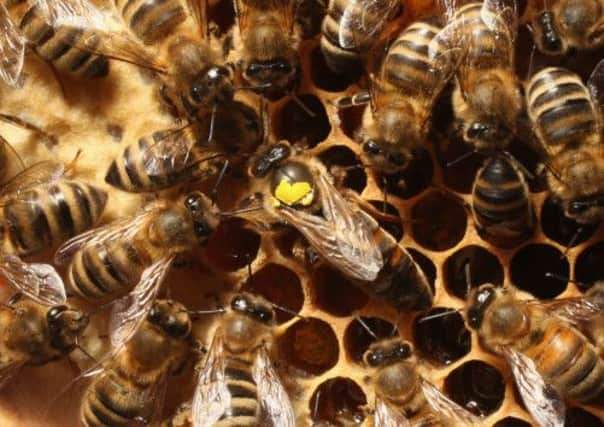Campaigners blame pesticides for decline of bees


Environment minister Richard Lochhead announced the investment yesterday to help apiarists replace around 4,000 colonies that were lost after late heavy snow caused widespread devastation last month.
But campaigners branded the move pointless without a moratorium on neonicotinoids, which have been blamed for the deaths of millions of bees worldwide.
Advertisement
Hide AdAdvertisement
Hide AdThe Scottish Government has so far supported Westminster in opposing a European Commission proposal for a two-year moratorium, which is due to be voted on again next week after failing to gain majority support.
Speaking during a visit to the Moray Beekeepers Association to open a new information and training centre on bees, Mr Lochhead said: “The late onset of spring has devastated our honey bee colonies and it’s estimated around 4,000 have been lost. Some farmers have seen their colonies virtually wiped out.
“That’s why we’re making £200,000 available to help commercial bee farmers restock and rebuild their colonies.”
While yesterday’s announcement was welcomed by beekeepers in Moray, UK charity Friends of the Bees said it was worthless when colonies were at risk of being completely destroyed by insecticides.
Friends spokesman and Scottish Borders apiarist Graham White said: “As a beekeeper who has lost eight out of ten colonies this winter, this all sounds great. But cash for dead bees is merely rearranging the deckchairs on the Titanic. The replacement bees would die within a season if they forage near oilseed rape. They are going out into a countryside that is utterly toxic to all insect life.”
He added: “Money will not solve this poisonous issue. The Scottish Government must ban neonicotinoids, or there will be no bees.”
The Scottish Wildlife Trust (SWT), which has been leading a campaign north of the Border to ban key neonicotinoids, echoed that view.
SWT head of policy Dr Maggie Keegan said: “Bee decline is not just down to the weather. We believe that the use of these insecticides is just adding to the weight of problems and until that is addressed, the government will have to keep on giving money like this.
Advertisement
Hide AdAdvertisement
Hide Ad“The best thing that the Scottish Government can do is advise Owen Paterson [the UK Environment Secretary] to agree with the European Commission’s recommendation to ban the use of three types of neonicotinoids, and that’s what the SWT has been asking the Scottish Government to do since last autumn.”
The EC is recommending a two-year moratorium on the use of three neonicotinoids – imidacloprid, clothianidin and thiamethoxam – because of fears that they are threatening the survival of bees by damaging the insects’ ability to forage.
The issue has divided the beekeeping community with the Scottish Beekeepers’ Association and the Stirling-based Bumblebee Conservation Trust against a ban amid concerns that farmers might revert to using chemicals with undisputed harmful affects.
Bee protests held in London
BEEKEEPERS and their supporters gathered in London’s Parliament Square yesterday to urge the government to support a European Union-wide ban on certain pesticides.
The demonstration came ahead of a vote in Brussels on Monday that will decide whether Europe introduces a two-year moratorium on various neonicotinoid pesticides.
One of the organisers, Matt Shardlow, chief executive of nature conservation organisation Buglife, said: “Britain abstained last time and has made no commitment this time, but we want them to support a ban across Europe. Some 73 per cent of the British public support a ban on these insecticides, we want the government to follow their lead.”
He said that even if the vote was lost, he was hopeful there may be other ways forward as the European Commission has a legal responsibility to protect the environment.
How you can help
The Moray Beekeepers’ Association offers advice to enthusiasts and the public alike on how to help bees survive through its Bee Aware in Moray campaign and upgraded training apiary outside Elgin, which was officially opened by environment minister Richard Lochhead yesterday.
Advertisement
Hide AdAdvertisement
Hide AdTop tips from Bee Aware in Moray project manager Tony Harris include:
Growing a herb garden –
“All flowering herbs are excellent for bees, such as thyme, sage, and lavender. They are ideal if you don’t have a big garden because you can grow them in small spaces like a pot and use them in cooking too.”
Planting wildflowers –
“Bees love all kinds of wild flowers and you can get seed packets in any garden centre. Open flowers like daisies are really good for pollinators because they can get to the nectar easily.”
Not using pesticides –
“Don’t use any pesticides in your garden. You might think they are only affecting greenflies but you’re targeting all other insects as well. All pesticides are damaging to bees.”
SEE ALSO: